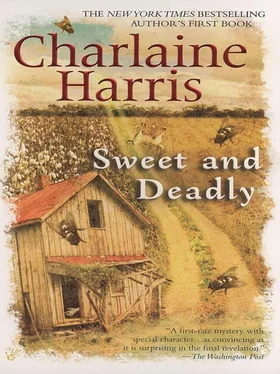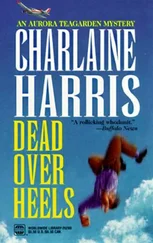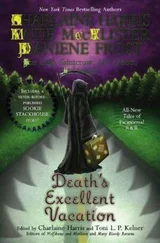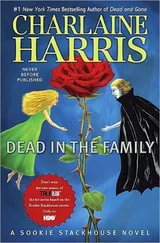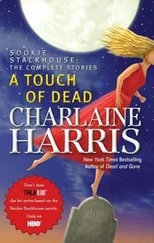“And you didn’t tell anyone,” Catherine said.
“No. My Percy, my youngest, was worried about getting that job…Little Betty run off, leaving them poor kids. Your folks got killed. I forgot all about it until Miss Leona got herself killed. Then I heard you’re in trouble, some folks think you did it. When you didn’t come after I left you that note, I had Percy tell you I had to see you. All this may be nothing, Miss Catherine. But no one ever asked me. Now I think all the time. Remember, I can’t go nowhere because of the arthritis.”
Betty plodded through her multitude of excuses again. Catherine believed her. It probably hadn’t seemed very important to her, except from the standpoint of warning her to watch out for Leona. And no one had asked Betty any questions.
“How close did you say this was to my parents’ death?” Catherine asked.
“Three days, I think. I can’t call to mind the day of the week. But three days, maybe two.”
“And you’re sure you don’t know who the man was?” Catherine asked, knowing the answer.
“That’s all I know, Miss Catherine.”
“I have to go now,” Catherine said shakily.
“Yes, ma’am.”
“Don’t say that,” she said sharply. Then she collected herself. “I’m sorry, Betty. I’m glad you told me. I’ll come again when I can.”
“You bring that beau of yours by,” said Betty, more cheerful now that her mind was at ease.
“I will, Betty. Goodbye. Thank you.”
Catherine walked through the sunflowers in a daze.
The children were scattered in the street, playing an amputated form of baseball. Catherine automatically smiled at them, and drove out of the black section very slowly, to avoid chickens and children.
She didn’t want to look in anyone’s face right then.
She drove out of Lowfield a little way, just to the west of the highway where the last houses straggled to a stop. There was a small area full of trees, surrounded by a high metal fence. She turned into it, under the arch over the open gate, and parked her car in the usual spot. Beyond the fence, she could see a tractor in the fields. Except for that distant human, she was alone.
Lately she had not gone there as much as she had at first.
The headstones still looked new. The graves were neat. Catherine made donations to the church fund that paid the caretaker.
She had always liked it there, even as a child. She had read all the older headstones, and knew the more striking epitaphs by heart. It was always peaceful, always quiet.
She sat beside her family. Her parents were beside her grandparents. And her great-grandparents.
She sat beside them and cried.
When the big gush died down to occasional tears, and she was still shaky, but quieted, she walked through the cemetery. It was a good place to think without interruption.
She tried to picture Betty on the witness stand.
She couldn’t.
She thought, Antelope? Angus?
Then she wiped off her face and returned to her car.
CATHERINE WAS IMMEDIATELY aware of the eyes. They peered from the door of the production room, and from the reception area. Two people were waiting there when she came in. They were obviously at a loss for what to do, without Leila at the desk to direct them. The door to Randall’s office was shut, and the sound of typing came from behind it.
She felt a glaze harden on her face. She moved stiffly. One of the two visitors was an advertiser, delivering his ad for the next issue. He was startled by the sight of Catherine. Perhaps he had hoped to go back to the production room and have a good chat with the staff. Catherine took the ad and calmly assured him that she would deliver it herself.
The second visitor was the librarian, Mrs. Weilenmann.
“I couldn’t reach you at home,” she told Catherine. “I just wanted you to know how much I’m-thinking of you.”
“Thank you,” Catherine said stiffly. “I can’t talk about it, please.”
Mrs. Weilenmann patted her on the shoulder, then left.
Randall’s door opened.
“I thought it was you,” he said. “Come in here.”
She gestured toward the empty desk. “I ought to be out here.”
“Mother’s been handling it. She had to go out for a minute, but she’ll be back.”
When he had closed the door, he held her to him. Catherine looked past his ear blindly.
He released her and looked into her face. She slowly reached up to touch his cheek.
“You should have stayed at home,” he said gently.
“No, no point in that.”
“Things here are pretty unpleasant,” he said.
He looked so depressed and so much older that Catherine was jolted into remembering something she had, incredibly, forgotten: that Randall feared Leona Gaites had been blackmailing his mother.
“Randall,” she said tentatively, “surely you’re not worried about Miss Angel?”
He looked at her uncomprehendingly.
“What? Oh, no. I did what you suggested. I just asked her. You were right. She said, ‘No, if Leona Gaites had approached me with any such proposition, I would have told her to publish and be damned, and that she was welcome to use my paper to publish in!’ I can’t understand now why I even worried about it. I guess just knowing we had a skeleton in our closet, knowing Leona had been taking advantage of skeletons to make money…”
“Is there something else you’re worried about?”
“Aside from hiring Tom’s replacement, and wondering when I can expect that bitch Leila to come back, so I can get her to train a new receptionist?” he asked sharply. Then he shook his head. “I’m sorry, Catherine. I’m just tired. I want all this to be over. I want this town to return to normal. I want to have time to see you in a regular relationship, without the stress and blood all around us.”
She wondered whether they would have become as close, if it hadn’t been for those very conditions of stress and blood. She thought not.
“We can’t worry about that now,” Catherine said. “We have to wait for this to end. Then there’ll be time to lie in the sun and go back to the levee. There’s something I want to tell you, something I just found out.”
Randall’s extension buzzed at that second, and he bent over his desk to pick it up. He gave Catherine an exasperated look of apology.
While he spoke into the receiver, Catherine’s gaze wandered over the collection of framed pictures and certificates covering the walls of his office. Four generations of Gerrard editors had occupied the room, so a great many of these mementos were yellowed. One piece of paper still white with freshness caught her eye.
“In appreciation of the services of Randall Gerrard and Dr. Jerry Selforth,” Catherine read with difficulty, “from the Junior Baseball Club of Lowfield County.”
I didn’t know Randall and Jerry were coaches, Catherine thought idly.
She pictured Randall in uniform at the plate, hitting a ball over the bleachers, throwing down the bat and heading for first base.
Throwing down the bat…She stiffened. Before she could stop herself, another image arose: Randall’s powerful arms swinging the bat at a blackmailing nurse, and at Tom. Maybe Leona hadn’t approached Angel Gerrard. Maybe she had approached Randall instead.
You fool, she lashed at herself savagely. Don’t you dare think for one minute…After all baseball bats are hardly rare or hard to buy.
But how accessible the weapon was to Randall. How easily he could obtain that heavy length of wood, if he needed a weapon.
She knew her judgment was clouded by physical exhaustion and grief. She stared at Randall while he wrangled with the advertiser on the other end of the line.
Читать дальше
